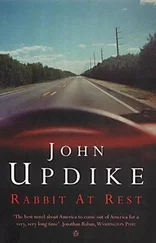John Updike - Rabbit Remembered
Здесь есть возможность читать онлайн «John Updike - Rabbit Remembered» весь текст электронной книги совершенно бесплатно (целиком полную версию без сокращений). В некоторых случаях можно слушать аудио, скачать через торрент в формате fb2 и присутствует краткое содержание. Жанр: Современная проза, на английском языке. Описание произведения, (предисловие) а так же отзывы посетителей доступны на портале библиотеки ЛибКат.
- Название:Rabbit Remembered
- Автор:
- Жанр:
- Год:неизвестен
- ISBN:нет данных
- Рейтинг книги:5 / 5. Голосов: 1
-
Избранное:Добавить в избранное
- Отзывы:
-
Ваша оценка:
- 100
- 1
- 2
- 3
- 4
- 5
Rabbit Remembered: краткое содержание, описание и аннотация
Предлагаем к чтению аннотацию, описание, краткое содержание или предисловие (зависит от того, что написал сам автор книги «Rabbit Remembered»). Если вы не нашли необходимую информацию о книге — напишите в комментариях, мы постараемся отыскать её.
Set 10 years after Harry "Rabbit" Angstrom's death, Rabbit Remembered returns listeners to the small Pennsylvania town where Harry's widow, Janice, and his son, Nelson, still reside. They are faced with a surprise when Annabelle, Harry's 39-year-old illegitimate daughter, arrives on the scene, bringing with her ghosts from the past.
Rabbit Remembered — читать онлайн бесплатно полную книгу (весь текст) целиком
Ниже представлен текст книги, разбитый по страницам. Система сохранения места последней прочитанной страницы, позволяет с удобством читать онлайн бесплатно книгу «Rabbit Remembered», без необходимости каждый раз заново искать на чём Вы остановились. Поставьте закладку, и сможете в любой момент перейти на страницу, на которой закончили чтение.
Интервал:
Закладка:
"I bet you all do," Michael sneers.
"We do, Michael. We want to improve your functioning, and we offer here at Fresh Start a safe environment for you to practice in, with the groups, the activities, the counselling. But you must attend."
"Hey. Sir. O.K. Can I be frank?"
"Of course."
"I can't stand these people. They're fat. They're queer. They're ugly. They're not my type."
"What is your type?" Nelson asks, and instantly regrets the hostility he hears in the question, which popped out reflexively.
"Loser," Michael responds, and laughs, a barking abrupt noise that doesn't belong to his frightened face. "Loser is my type."
"Not so. You or anyone here. We're human, which isn't always easy. The other clients are kind people, here to help each other. They care about you, if you let them."
"They wouldn't if they knew what's inside my head." He jerks forward in the straight chair. His complexion looks a little clammy, moist at the hairline. The poisoned eyes swarm with shame and yet with an excitement that something transformingly strange is happening to him. "The voices whisper to me about girls I see on the street. This one and that one. They tell me to picture her shitting."
"Shitting?" Nelson has been betrayed into confessing surprise. Perhaps Michael intended this. He wonders how much of an enemy the boy sees him as. Does he sense, within his mental-health counsellor, some ethnic enmity, with envy of his easy slender build and dago good looks? When Nelson tries to picture what a schizophrenic sees he remembers Howie Wu telling him, Their sense of distance has broken down. Things up close look far away, is how Nelson has framed this-there is no clear depth in which to locate yourself. The gears that notch us one into another fail to mesh, maddeningly, meltingly. Trying to think his way into Michael's head plants a sliding knife inside Nelson, a flat cold queasy sensation below his ribs.
"They show me her squatting down. I want to rub her face in it. I want her to eat it. Does that shock you?"
"No," Nelson lies.
"Well, it does me." Michael slumps back as far as the chair allows him. His affect is flattening; his eyes narrow as he recalls, "Thirty thousand bucks a year, think of it, plus extras and my own car. Pussy everywhere. Hot-shit professors. A bunch of frats rushing me. And I fucked up. I couldn't hack it. I didn't even know what courses I was supposed to be taking. I hid in my room with the shades down until my roommate complained to the dean and they got the psych service on me. They tell me I told the dean or somebody he was the Whore of Babylon. I never heard of her." He snickers a little, testing the face opposite his.
"Michael," Nelson says in firm conclusion. The boy was bragging now, bullying. When you feel uncomfortable, Howie has told him, trust your gut. Get off the horse. "I can't emphasize enough how important it is that you are faithful with your medications. I've made a note here to Dr. Wu to reconsider the Trilafon dosage."
"I drank beer and tequila at Penn," Michael tells him, uncertainly standing, sensing he is dismissed and being relieved yet not, unsatisfied, uncured. "My parents didn't know it, but I would get fucking blasted. I think that's what screwed up my brain."
"I don't think so. The human brain can take a lot of beer. Michael, this is not your fault" Nelson says, coming around his desk so that in the tiny office the boy-tall when he stands up, his girlish mouth sagging, his face glimmering in the rainy light, begging to be understood-has nowhere to go but out, to the waiting room, where his parents are eager to come in.
"Such a gorgeous child," says Mr. DiLorenzo, when a second chair has been pulled up for his wife in front of Nelson's desk. "Bright, good, A miracle boy. To have this boy after his three sisters and Maria over forty, it seemed to us a miracle." He speaks carefully, with dignity, as one who remembers when he spoke English less well, the child of immigrants who spoke it hardly at all. His hair, brushed straight back, is going white but his bushy eyebrows are still black.
The wife speaks up: "Even as a little boy, though, he stood apart a little. He would play with others, but then wander away and come inside. I'd say, 'What's wrong?' He'd say, 'Nothing.' As if he didn't see the point of people. He was quiet. He never had a tantrum."
"My wife imagines things in hindsight," Mr. DiLorenzo says, sitting back erect, his eyes enlarged by thick spectacles, eyes frayed to death from closely inspecting fabric. "He was a perfectly normal boy. Got top marks, too, all the way up through senior year. Gave the salutatorian speech about how we should help Russia keep democracy and capitalism. Never any trouble to anybody- teachers, me, nobody."
"A little trouble would have been more normal," his wife says. "At the time I wondered if having all those older sisters hadn't taken something out of him. My daughters and me, we had too good a time, always laughing, always busy at the house, always telling each other things. Michael was like a little prince, detached."
"Don't listen to her, Mr.-"
"Angstrom. Nelson if you'd rather."
"Don't listen to her, Nelson. He was fine. He played sports, got the good marks, ran for student council. Said no to drugs, booze. An altar boy, too, until he was fifteen, and we didn't push that. In America religion becomes your own business. Likewise I told him, 'Michael, listen, you want to forget the dry-cleaning business, be some kind of professional-a doctor, lawyer, whatever, sit behind a desk using your smarts-that's O.K. with me, and Mamma too. Whatever makes you happy. This is America.' But no, he wanted to learn dry-cleaning, summers, after school, it was what he loved. From me there was absolutely no pressure."
"There was pressure," Mrs. DiLorenzo tells Nelson. "Joe needed him to carry on and he knew it. That he didn't come out and say it made it worse. The girls, they married and got out of here. They'd had enough of it, the chemicals, the presses, the hours until seven, eight. Only one of them even stayed in the state, and she's way out near Pittsburgh, a nice suburb up along the Allegheny. Their husbands, what do they care about dry-cleaning? It was all on Michael, and he knew it. He snapped. Men don't want their whole lives mapped out for them. They want adventure. Isn't that right, Mr. Nelson?"
"She's crazy," Mr. DiLorenzo confides. "He didn't want adventure. He wasn't like these young hoodlums these days, their heads full of, what do they call it, hip-hop, grabbing guns and going off to shoot their classmates to make the evening news. Shooting their parents, no respect for anything under the sun. He wanted to carry on the family business. There was no pressure. At Penn he was taking chemistry to be on top of the best, the newest solvents, the most environmentally sensitive as we say now. Disposal of used cleaners is the number-one headache in this business; a single cancer lawsuit can wipe you out-defending against it, even if you win. I love America, but not its justice system."
"Joe, there was pressure." To Nelson Mrs. DiLorenzo explains, "My husband, he slaved to build up Perfect. He began by doing dirty work for this old Jew in South Brewer, just a basement in a row of houses, a little dark slot, his equipment crowded into the back, a shed built illegally, fifty cents an hour if he got that, Joe was always being chiselled. When the Jew died Joe borrowed to buy the business from the widow and named it Perfect Cleaners himself."
"It's prettier in Italian, perfetto" Mr. DiLorenzo said, drawing out the word, "but this is America. Things want to be perfect here. Don't mind Maria-Jake was good to me, he taught me the trade. Had me out on the vats first, breathing in carbon tetrachloride before the switch to petroleum solvents, then had me as a finisher, on the steam presses, and then a spotter, that takes skill-you can ruin a silk blouse, a fine wool suit. After a while it was going so good I opened a branch in West Brewer, and then one up in Hamburg, and two years ago this industrial acreage came up for sale in Hemmigtown. For a long time I'd been wanting to build a bigger plant, with summer fur storage and equipment to take anything, to take even old lace tablecloths, they get yellow with age, very fragile, and big velvet curtains where you could choke on their dust, some of these mansions in Perm Park and up along Youngquist, the owners never-"
Читать дальшеИнтервал:
Закладка:
Похожие книги на «Rabbit Remembered»
Представляем Вашему вниманию похожие книги на «Rabbit Remembered» списком для выбора. Мы отобрали схожую по названию и смыслу литературу в надежде предоставить читателям больше вариантов отыскать новые, интересные, ещё непрочитанные произведения.
Обсуждение, отзывы о книге «Rabbit Remembered» и просто собственные мнения читателей. Оставьте ваши комментарии, напишите, что Вы думаете о произведении, его смысле или главных героях. Укажите что конкретно понравилось, а что нет, и почему Вы так считаете.












